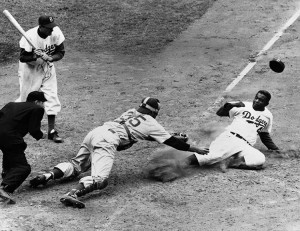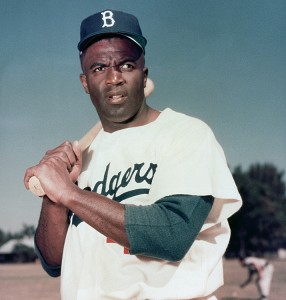Jackie Robinson 100
January 30, 2019
On Jan. 31, 1919, 100 years ago tomorrow, American baseball star and civil rights icon Jackie Robinson was born in the southern Georgia town of Cairo. In 1947, Robinson became the first African American to play modern Major League Baseball (MLB). An immensely talented athlete—he hit, ran, and fielded his way to the Baseball Hall of Fame—Robinson is also remembered for his courage and demeanor in the face of brutal racism on and off the baseball field.
Tomorrow, the Jackie Robinson Centennial Celebration, a year-long tour organized by the Jackie Robinson Foundation, begins with a photograph exhibition at the Museum of the City of New York. Various other events will follow in cities across the country—including a speakers’ series, a jazz concert, and a traveling artifact exhibit. The tour ends in December with the grand opening of the new Jackie Robinson Museum in New York City. The Jackie Robinson Foundation provides scholarships and education programs for minority youths and oversaw the creation and funding of the museum.

Jackie Robinson, shown here sliding into home plate, was the first African American player in modern Major League Baseball. Credit: UPI/Corbis-Bettmann
Jack Roosevelt Robinson was born in Georgia, but his family took him to southern California when he was an infant. Robinson starred in football, basketball, baseball, and track in high school and at Pasadena Junior College. He transferred to the University of California at Los Angeles (UCLA) in 1939. There, he earned varsity letters in the same four sports. In 1941, Robinson dropped out of UCLA to help support his mother by working at a youth camp. He also played minor league and semiprofessional football. (Jackie’s older brother, Mack, was also an excellent athlete: he was faster than all sprinters except teammate Jesse Owens at the 1936 Olympic Games.)
From 1942 to 1944, during World War II, Robinson served in the United States Army. Robinson started his professional baseball career in 1945 with the Kansas City Monarchs of the Negro American League. The league was made up entirely of blacks. At the time, baseball was racially segregated—that is, black players were not allowed to play in the major or minor leagues. In 1946, Robinson broke through baseball’s racial segregation barrier by playing for the Brooklyn Dodgers’ minor league team in Montreal, Quebec.
In 1947, Robinson joined the Dodgers to become the first African American in the big leagues since the 1880’s. Robinson’s impact on segregation in sports went far beyond the Dodgers. After baseball desegregated, other professional sports quickly followed, and a number of previously segregated hotels and restaurants began to admit blacks. Robinson was a six-time National League (NL) All-Star and the NL Most Valuable Player in 1949. He retired after the 1956 season.
In 1956, Robinson received the Spingarn Medal. The medal is an award given annually to an outstanding African American. Robinson was elected to the National Baseball Hall of Fame in 1962. He died on Oct. 24, 1972.
In 1997, on the 50th anniversary of Robinson’s breaking the MLB color barrier, his uniform number, 42, was retired across the league. No single player now wears 42, but every April 15—the date of his first MLB game—every player wears 42 for Jackie Robinson Day. In 2013, the motion picture 42 detailed Robinson’s life story. Robinson played himself in the 1950 film The Jackie Robinson Story.



